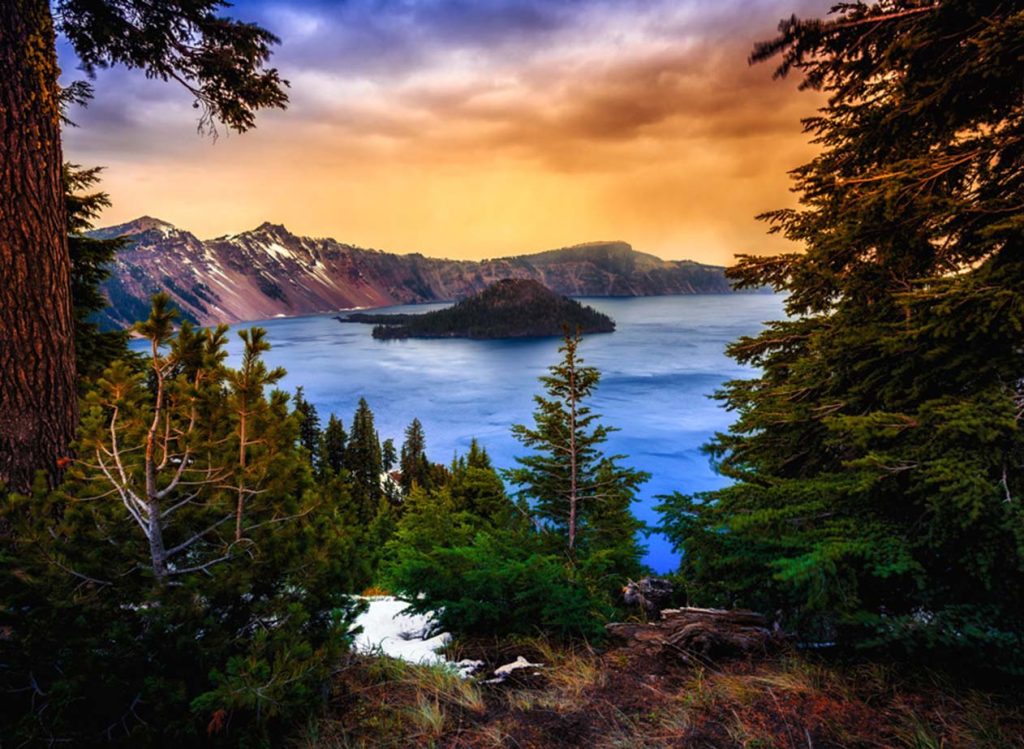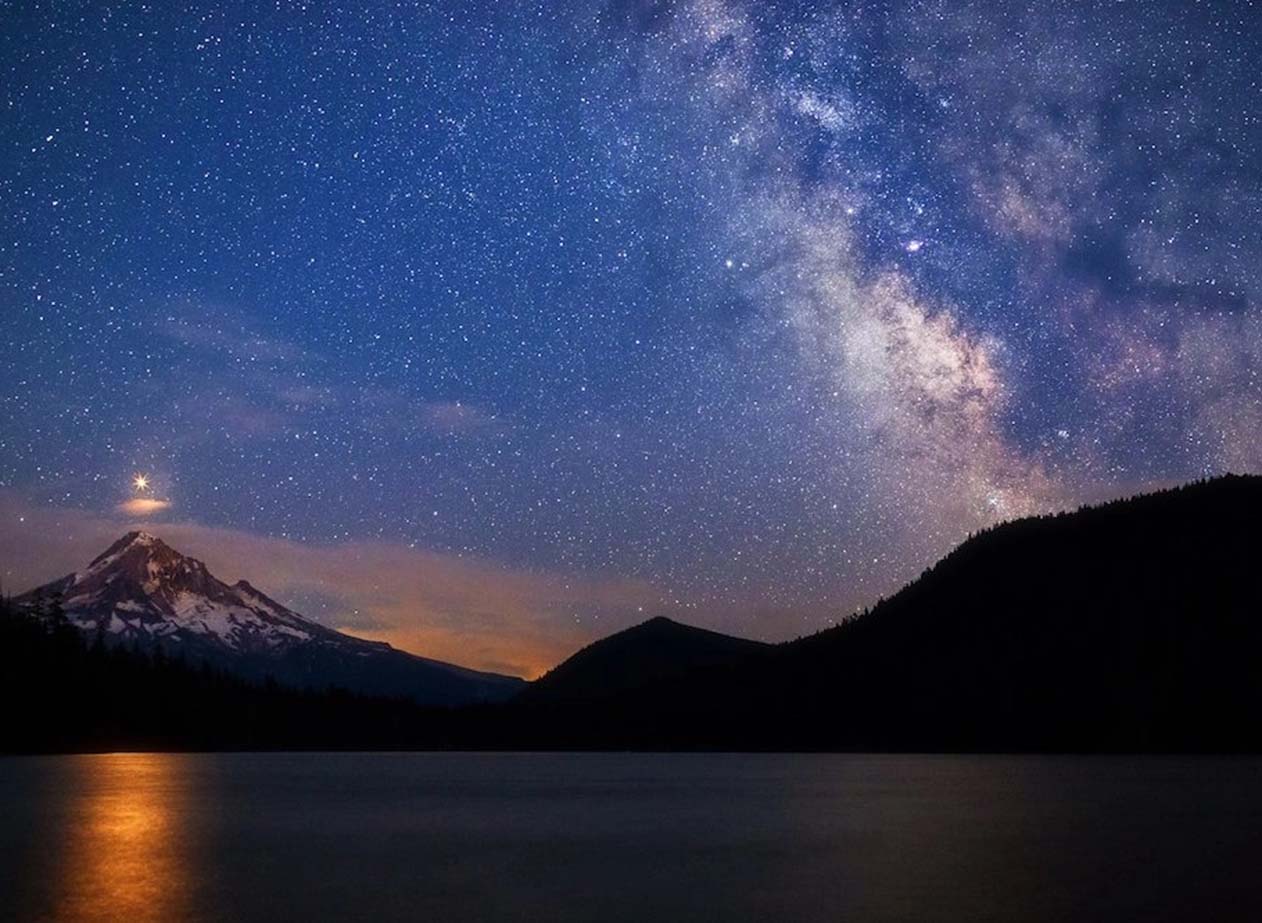If you’re like me and have a passion for stargazing, you’ll want to add Oregon to your list of must-visit destinations. The Beaver State is famous for its dark skies, making it an ideal location for observing the celestial wonders. I’ve had the pleasure of experiencing the mesmerizing Oregon night sky, and I’m here to share some tips and advice to ensure your stargazing adventure is out of this world.
Go with a Group:
Stargazing is undoubtedly a mesmerizing experience when you’re alone, but there’s something truly magical about sharing the night sky with a group of friends or fellow stargazers. Here’s why I highly recommend it:
- Collective Excitement: When you witness the awe-inspiring celestial displays with others, the shared excitement amplifies the experience. The gasps, wows, and expressions of wonder create a sense of togetherness and make the whole adventure more memorable.
- Knowledge Exchange: Everyone brings their unique knowledge and perspectives to the stargazing event. You’ll learn from each other, whether it’s identifying constellations, sharing stargazing tips, or discussing the scientific marvels of the universe. It’s a fantastic opportunity for intellectual growth and expanding your horizons.
- Safety in Numbers: Stargazing often takes us to remote or dark locations, and being alone in the wilderness can be risky. Having a group provides a safety net. You can rely on each other in case of emergencies, and it’s also comforting to know you’re not alone in the dark.
Check the Weather:
Weather plays a pivotal role in the success of your stargazing adventure. Oregon’s unpredictable climate adds an element of excitement, but it’s essential to be prepared. Here’s why monitoring the weather is crucial:
- Clear Skies for Optimal Viewing: Stargazing is all about gazing at the stars, planets, and other celestial wonders. Cloudy skies can obscure these phenomena, making your trip less rewarding. Checking the weather forecast allows you to choose nights with the best chances of clear skies.
- Safety Considerations: Unpredictable weather in Oregon can include sudden storms, strong winds, and temperature drops. Staying informed about the forecast helps you prepare with appropriate clothing and gear, ensuring your comfort and safety.
- Time and Location Optimization: By keeping an eye on the weather, you can plan your stargazing adventure for the right time and location. This ensures that your efforts and anticipation are rewarded with the most spectacular views the night sky has to offer.
Going stargazing with a group enhances the experience through shared excitement, knowledge exchange, and safety, while checking the weather is essential to make the most of your trip by ensuring clear skies, safety, and optimizing your viewing conditions. These practices combined can make your stargazing adventure in Oregon a truly unforgettable and rewarding experience.
Watch the Moon:

When it comes to stargazing, the moon is a celestial player that can dramatically influence your experience. Understanding its phases and position in the night sky is essential for an optimal stargazing adventure. Here’s why it matters and how you can make the most of it:
- The Moon’s Influence: The moon, with its luminous presence, can be both a blessing and a challenge for stargazers. Its light can wash out the fainter stars and celestial objects, especially during a full moon when it’s at its brightest. This can make it challenging to observe the subtle details of the night sky.
- Choosing the Right Phase: To make the moon work in your favor, it’s crucial to plan your stargazing trip around the moon’s phases. The new moon phase, when the moon is invisible, is a stargazer’s dream. During this time, the night sky is exceptionally dark, allowing you to see even the faintest stars, galaxies, and nebulae.
- Moon’s Position: Consider the moon’s position in the sky during your stargazing hours. If the moon is below the horizon or has not yet risen, you’ll have a few hours of pristine, moon-free stargazing. This is often the best time to observe deep-sky objects and constellations without lunar interference.
- Benefits of Moonless Skies: Moonless skies offer several advantages for stargazers. You can enjoy enhanced contrast, making it easier to spot galaxies, star clusters, and nebulae. Your eyes can adapt better to the dark, allowing you to see more stars and appreciate the night sky’s beauty to the fullest.
- Ideal Locations: Some of the best locations for stargazing in Oregon are remote areas with minimal light pollution. These spots provide a pristine backdrop for moonless sky observations. When the moon is below the horizon and you’re in a dark-sky location, the universe opens up before your eyes, revealing its hidden treasures.
Being mindful of the moon’s phases and its position in the sky is essential for successful stargazing in Oregon. Planning your trip during the new moon phase and choosing ideal locations with minimal light pollution will maximize your chances of experiencing the brilliance of the night sky, unobstructed by the moon’s glow.
Pack a Paper Map:
In this age of advanced technology and digital navigation, it might seem old-fashioned to carry a physical map. However, when it comes to stargazing in Oregon’s remote areas, a paper map is an invaluable tool. Here’s why it’s crucial and the benefits it offers:
- Signal Reliability: One of the key reasons to bring a paper map is the uncertainty of smartphone and GPS signals in remote parts of Oregon. When you venture deep into the wilderness for stargazing, there’s a real possibility that you may lose signal, rendering your digital navigation tools useless. A paper map doesn’t rely on signals and can guide you even when technology fails.
- Comprehensive Coverage: Paper maps provide a broader view of the region, allowing you to see the entire area at once. This is especially useful when navigating through vast and unfamiliar landscapes. You can trace your route, spot landmarks, and plan your stargazing locations more effectively.
- Redundancy for Safety: Safety is a significant concern when you’re in remote areas. Carrying a paper map as a backup ensures that you can find your way back to civilization or help in case of an emergency. It’s a safety net that can be a lifesaver in critical situations.
- Avoiding Unplanned Detours: GPS devices may sometimes suggest routes that aren’t ideal for stargazers, like private roads or impassable terrain. A paper map allows you to plan your route in advance, reducing the risk of unexpected detours or roadblocks.
- Preserving Battery Life: Using a smartphone or GPS for navigation can quickly drain your battery, leaving you without a communication device. By relying on a paper map for navigation, you can conserve your digital devices for emergencies or capturing the beauty of the night sky.
- Tangible Souvenir: Lastly, a paper map can serve as a tangible memento of your stargazing adventure in Oregon. It’s a physical record of the places you’ve explored, offering a sense of connection to the land and the memories you’ve made.
Packing a paper map when stargazing in Oregon is a practical and safety-conscious decision. It provides reliability in areas with unreliable signals, offers comprehensive coverage, serves as a backup for emergencies, helps you avoid unexpected detours, preserves your device’s battery life, and even becomes a keepsake of your remarkable journey. So, don’t forget to include a paper map in your stargazing toolkit when exploring the wilderness of Oregon.
Preserve the Beauty of Oregon:

Stargazing in Oregon is a breathtaking experience, but it’s crucial to remember that our actions can impact the environment. Here’s why it’s important to preserve Oregon’s natural beauty and the benefits of doing so:
- Conservation of Ecosystems: Oregon’s wilderness is home to a diverse range of plants and wildlife. By being respectful of the environment and adhering to Leave No Trace principles, we minimize our ecological footprint and reduce the disturbance to these fragile ecosystems.
- Future Generations: Preserving the natural wonder of Oregon ensures that future generations can also enjoy the same pristine landscapes and starry skies. Our responsibility to protect these areas is a gift we pass on to those who come after us.
- Ethical Stargazing: Disturbing the environment not only harms nature but also affects the quality of stargazing. Light pollution and human presence can obscure the night sky and diminish the experience. Respecting the environment is an essential aspect of ethical stargazing.
- Positive Impact: By packing out all your trash, respecting established trails, and avoiding disturbances to wildlife, you set an example for others to follow. Your responsible actions can inspire a culture of conservation and help protect these beautiful landscapes.
Photography Tips:
Astrophotography is a fantastic way to capture the magic of the night sky, and Oregon offers some of the best backdrops for such endeavors. Here are some valuable photography tips for stargazing:
- Tripod and Manual Settings: A stable tripod is essential for astrophotography to keep your camera steady during long exposures. Utilize manual camera settings to have complete control over exposure, aperture, and ISO. This control allows you to capture the stars’ brilliance accurately.
- Wide-Angle Lens: A wide-angle lens is ideal for astrophotography as it captures a broader portion of the night sky. This lens type is well-suited for framing constellations, the Milky Way, and other celestial objects.
- High ISO for Stars: To capture the faint light of distant stars, use a high ISO setting. Higher ISO values make your camera’s sensor more sensitive to light, allowing you to reveal stars that might be otherwise imperceptible.
- Long Exposure: Long exposure times are key to astrophotography. By leaving your camera’s shutter open for extended periods, you can capture more light and detail from the night sky. Experiment with exposure times to achieve the desired effect.
- Patience and Practice: Astrophotography is an art that requires practice and patience. Don’t be discouraged by initial attempts that may not meet your expectations. With time and practice, you’ll refine your skills and capture stunning images of the night sky.
Preserving the natural beauty of Oregon through responsible stargazing practices ensures the continued enjoyment of its landscapes and night skies. Moreover, following ethical principles when stargazing enhances the quality of the experience for everyone. Meanwhile, astrophotography offers a unique opportunity to capture the beauty of the night sky and share it with others, provided you have the right equipment and techniques.
Layer Your Clothing:
Oregon’s unique geography and varying elevations can result in dramatic temperature changes, even during the summer. Layering your clothing is not just about comfort; it’s a practical necessity for an enjoyable and safe stargazing experience. Here’s why it’s essential and the benefits it offers:
- Temperature Variability: Oregon’s climate can be unpredictable, with nighttime temperatures dropping significantly, especially in higher elevation areas where the best stargazing spots often lie. Layering allows you to adjust your clothing as the temperature changes, ensuring that you’re neither too cold nor too hot.
- Comfort and Adaptability: Layering provides the flexibility to add or remove clothing as needed. You can stay comfortable and focused on stargazing without worrying about the weather. It’s the key to staying cozy while waiting for meteors, observing constellations, or photographing the night sky.
- Protection from the Elements: Weather conditions can change unexpectedly, and you might encounter wind, mist, or light rain during your stargazing adventure. Layered clothing acts as a buffer, protecting you from these elements while maintaining your comfort.
- Preventing Overheating: While the nights can be chilly, stargazing can still involve physical activity, such as setting up equipment or walking to different vantage points. Layering allows you to remove outer layers to prevent overheating when you’re on the move.
- Safety and Health: Staying warm is not only about comfort but also about staying safe and healthy. Extremely cold temperatures can lead to hypothermia if you’re not adequately dressed. Layering helps you maintain a safe body temperature while stargazing in different weather conditions.
Essential Items to Bring:
To make the most of your stargazing adventure in Oregon, it’s crucial to be well-prepared with the following essentials:
- Red Flashlight: A red flashlight is a must-have tool for stargazers. Red light doesn’t disrupt your night vision, allowing you to read star charts, adjust camera settings, or navigate without blinding yourself or others. It’s an essential piece of equipment for maintaining your night vision.
- Binoculars or a Telescope: These optical instruments enhance your stargazing experience by allowing you to get a closer look at celestial objects. Whether you’re spotting distant stars or exploring the craters of the moon, binoculars or a telescope can provide incredible details and make your adventure even more exciting.
- Bug Spray: Some stargazing locations in Oregon may be prone to mosquitos and other insects, especially during the warmer months. Bug spray helps keep those pesky critters at bay, allowing you to focus on the night sky rather than swatting away insects.
- Snacks and Water: Stargazing sessions can be lengthy, especially if you plan to stay overnight. Pack snacks and water to keep yourself hydrated and fueled, ensuring you have the energy to stay engaged and enjoy the night sky to the fullest.
- Camping Gear: If you intend to make your stargazing adventure an overnight experience, bring appropriate camping gear, including a tent, sleeping bag, and other necessities. Camping allows you to extend your stargazing session and truly immerse yourself in the natural beauty of Oregon.
Layering your clothing ensures comfort and adaptability in Oregon’s variable climate, protecting you from the elements and promoting safety. Additionally, bringing essential items like a red flashlight, optical instruments, bug spray, snacks, water, and camping gear enhances your stargazing experience, making it more enjoyable and convenient. These preparations help you make the most of your stargazing adventure in the Beaver State.
Oregon offers some of the most spectacular stargazing opportunities in the United States. With the right preparation and a bit of planning, you can experience the magic of the night sky in this beautiful state. Just remember to check the weather, keep an eye on the moon, and pack accordingly. Let’s all do our part to preserve the natural beauty of Oregon while marveling at the wonders of the universe above. Happy stargazing, fellow adventurers!



